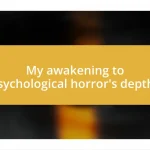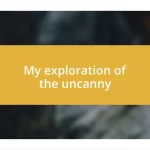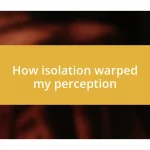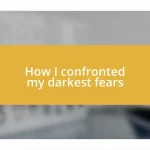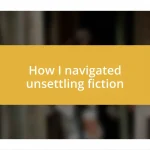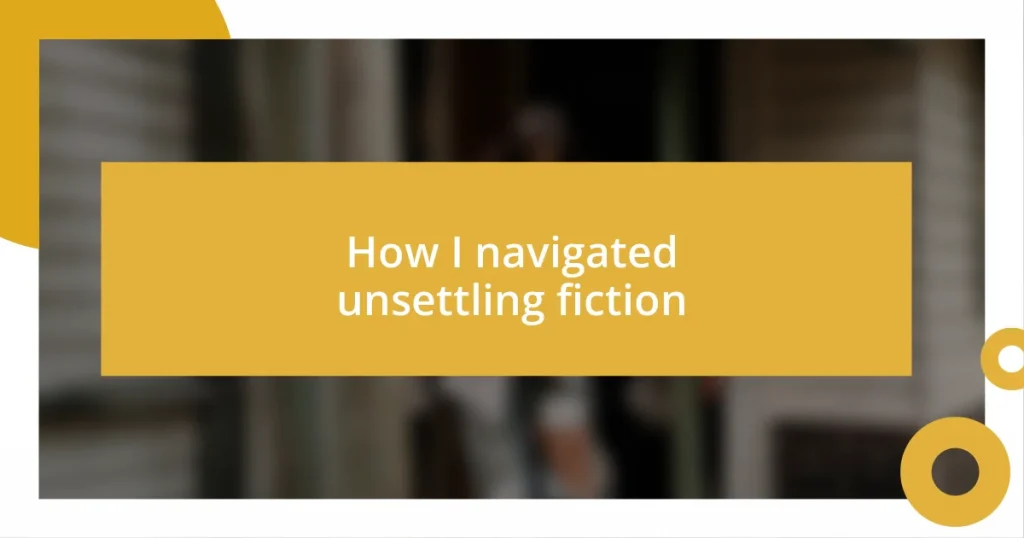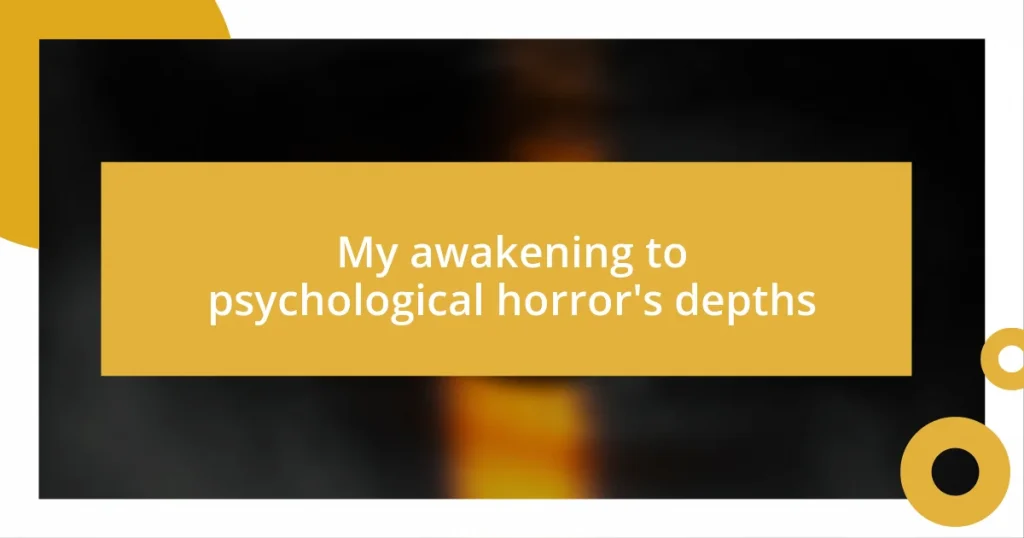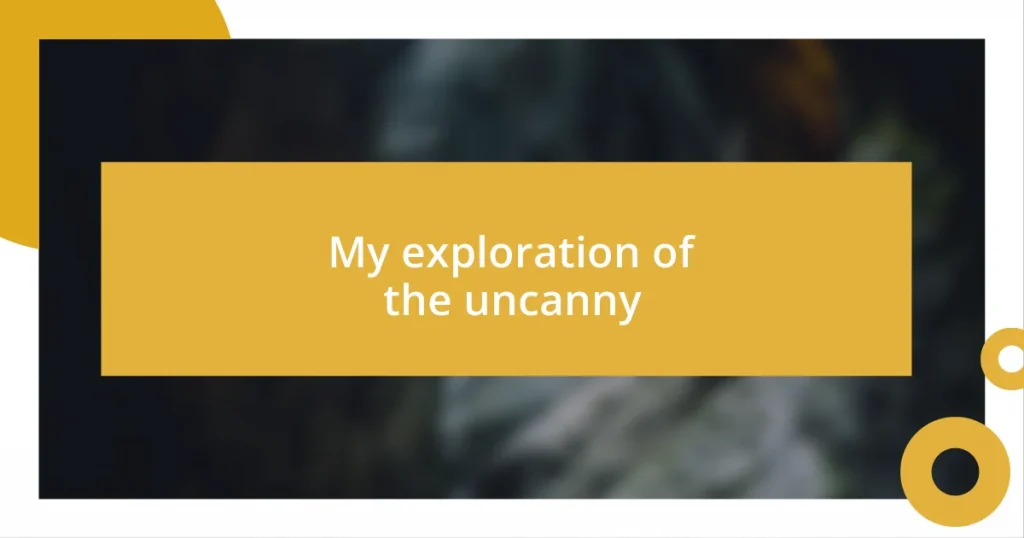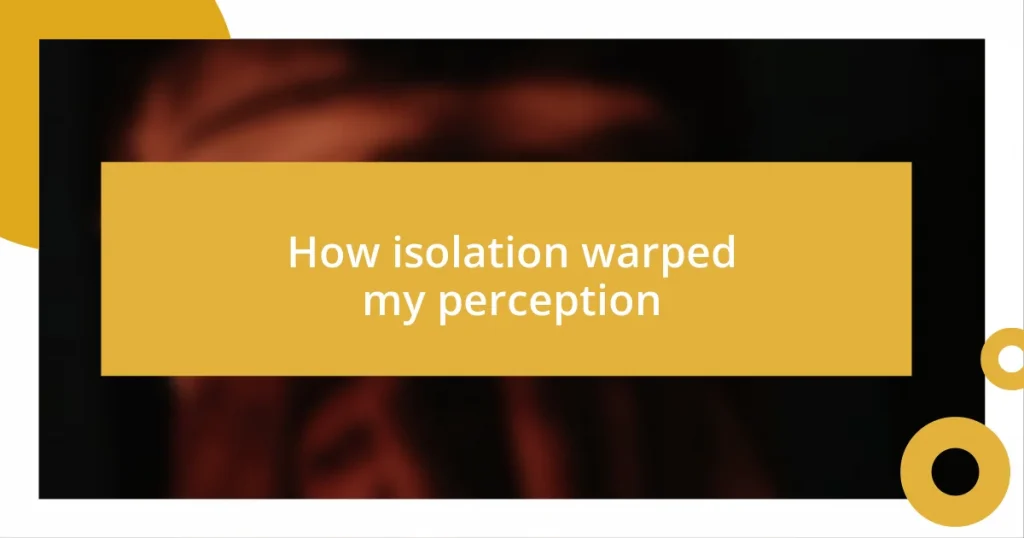Key takeaways:
- Unsettling fiction can provoke deep emotional responses, prompting readers to confront personal fears and question their beliefs about morality and human nature.
- Identifying personal triggers and engaging in discussions with others enhances understanding and helps process emotions associated with challenging narratives.
- Embracing discomfort in literature can lead to personal growth, transforming unsettling experiences into opportunities for introspection and insight.
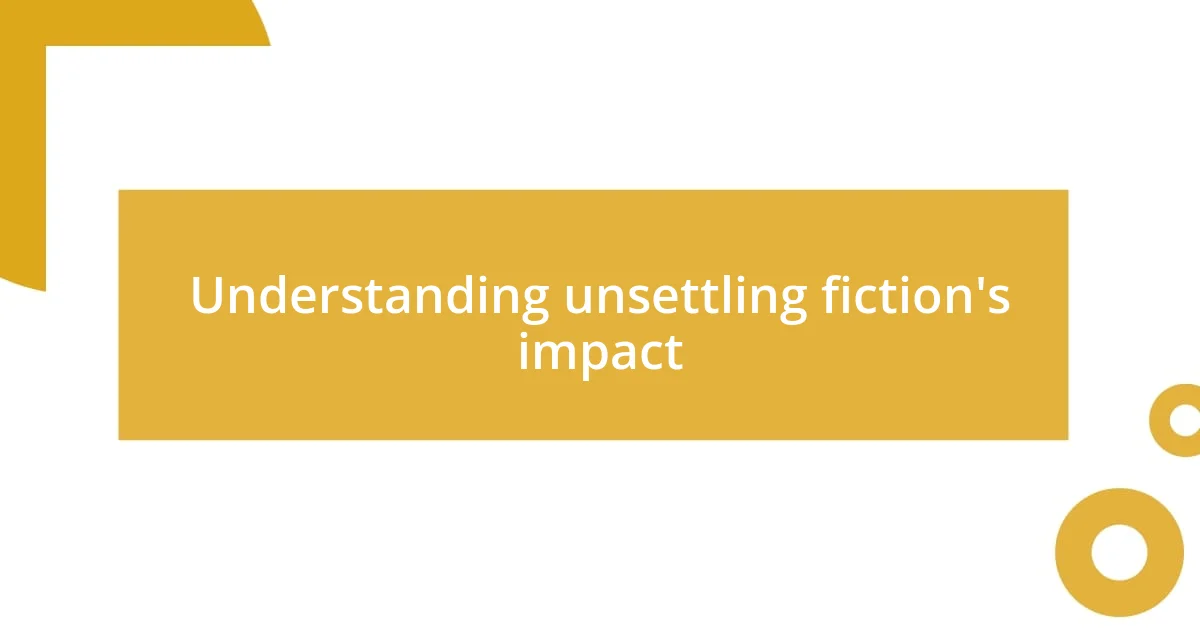
Understanding unsettling fiction’s impact
Unsettling fiction can evoke an emotional whirlwind, stirring feelings of anxiety, unease, or even dread. I remember reading a short story that left me staring at the ceiling long into the night, unable to shake off the sense of foreboding it created. Isn’t it fascinating how a few carefully chosen words can penetrate our comfort zones and make us question our realities?
The impact of such narratives often lingers far beyond the pages they inhabit. When I finished a particularly disturbing novel, I found myself reconsidering my beliefs about morality and human nature. It was as if the author had peeled back layers of my understanding, exposing raw truths that I wasn’t quite ready to confront. Have you ever finished a book and felt as if you had to reassess your own values?
Through these intense experiences, unsettling fiction invites us to confront our deepest fears and uncertainties. I’ve often found that grappling with these emotions in stories helps me process my own challenges. It’s a strangely cathartic journey—one that makes me wonder: how often do we shy away from uncomfortable truths in our own lives, only to find solace in the pages of a book?
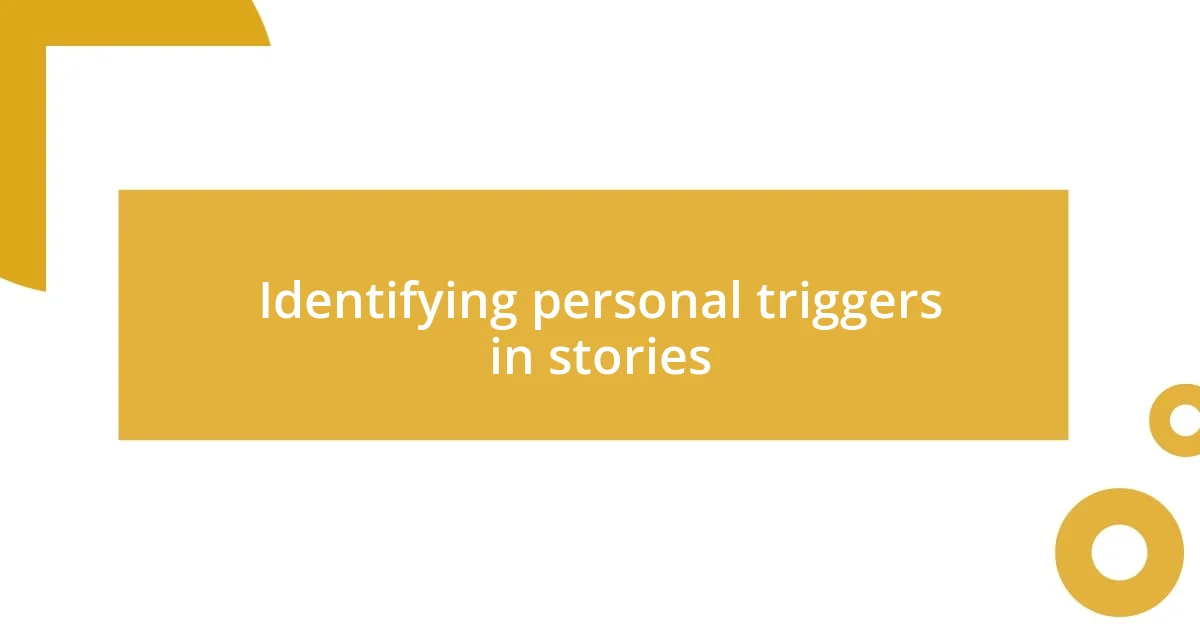
Identifying personal triggers in stories
Identifying personal triggers in stories requires a thoughtful examination of what resonates with our individual experiences. For instance, I recently realized that narratives involving betrayal hit me particularly hard, echoing personal events from my past that I’ve tried to forget. This awareness led me to reflect on how writers craft scenarios that can tap into our hidden vulnerabilities, making the emotions feel incredibly personal and intense.
To better recognize these triggers, consider the following pointers:
– Reflect on Past Experiences: Think about moments in your life that evoke strong emotions, whether they’re positive or negative.
– Track Emotional Responses: Keep a journal of your reactions while reading, noting specific scenes that stir feelings of discomfort or nostalgia.
– Discuss with Others: Sharing your thoughts with friends or a reading group can reveal similar triggers and provide insights into your own feelings.
– Explore Thematically: Identify themes in stories that resonate with you—loss, identity, fear—and understand why they affect you so deeply.
– Revisit Challenging Reads: Rereading stories that had a significant impact can help clarify which elements disturbed you and why.
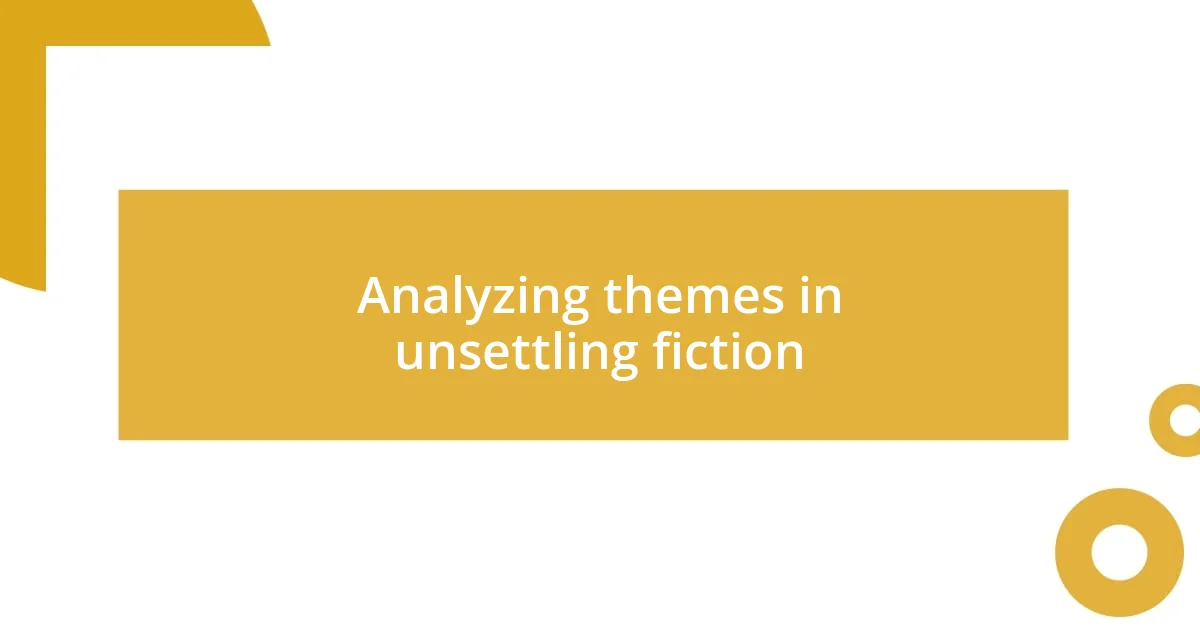
Analyzing themes in unsettling fiction
Unsettling fiction often delves into themes that force us to confront our darkest fears, making the reading experience powerfully introspective. I remember finding myself immersed in a tale that explored the fragility of sanity. The protagonist’s slow descent into madness felt eerily familiar, almost as if the author was inviting me to examine the edge of my own mental boundaries. Isn’t it intriguing how fiction can illuminate personal struggles we might not even be aware of?
Exploring themes such as isolation and existential dread offers an opportunity to reflect on our own experiences. In one particularly haunting story, I was captivated by the characters’ profound loneliness, which resonated with moments from my life when I felt disconnected from everyone around me. It’s a stark reminder that unsettling fiction doesn’t just entertain; it prompts significant self-reflection about human connections and our place in the world.
Through examining these themes, I often find that unsettling fiction serves not just to unnerve, but to encourage a deeper understanding of ourselves. For instance, encountering a narrative centered on moral ambiguity challenges our definitions of right and wrong. I remember putting down a book after such an encounter, grappling with the weight of the ethical dilemmas presented. It’s the discomfort from these narratives that paves the way for growth. Each theme explored acts as a mirror, revealing aspects of my psyche I sometimes prefer to overlook.
| Theme | Example |
|---|---|
| Isolation | A character grappling with profound loneliness in a dystopian setting. |
| Moral Ambiguity | A story questioning the protagonist’s choices in life-or-death situations. |
| Existential Dread | A narrative highlighting the struggles with one’s identity and purpose. |
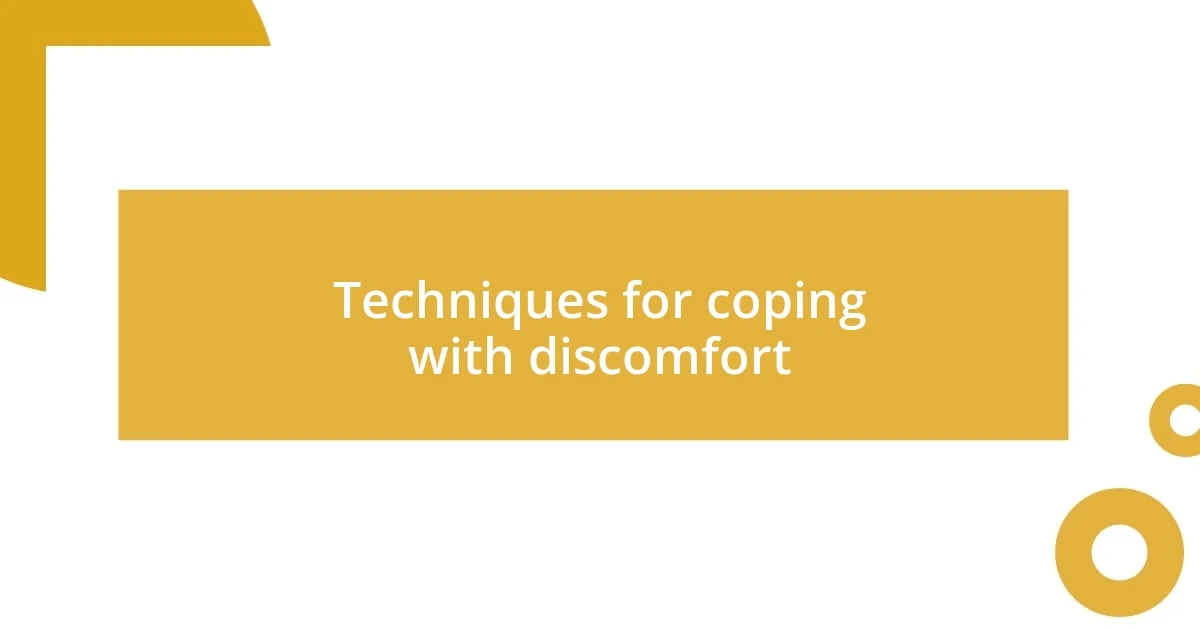
Techniques for coping with discomfort
Coping with discomfort while diving into unsettling fiction can be as vital as the stories themselves. When I encounter a particularly jarring scene, my go-to strategy is taking a break. Stepping away to immerse myself in something lighter—perhaps a favorite comedy show—allows my mind to recalibrate. Isn’t it fascinating how a good laugh can ease the heaviness of darker narratives?
Another technique I’ve found beneficial is engaging with the text actively. Instead of passively absorbing the story, I ask myself questions about the characters’ motivations and the author’s intentions. For example, I often wonder, “Why did the author choose this unsettling scenario?” This approach transforms my discomfort into curiosity, making the reading experience more interactive and less overwhelming. It’s amazing how shifting perspectives can reveal deeper layers of the narrative.
Lastly, I’ve learned the power of community. Joining book clubs or online forums to discuss these unsettling reads has enriched my perspective. Sharing my feelings—whether confusion, anger, or discomfort—helps me to see the story through the lens of others’ experiences. Have you ever felt that sense of relief when someone articulates your thoughts perfectly? It’s a reminder that unsettling fiction, while disquieting, can also foster connection and understanding among readers.
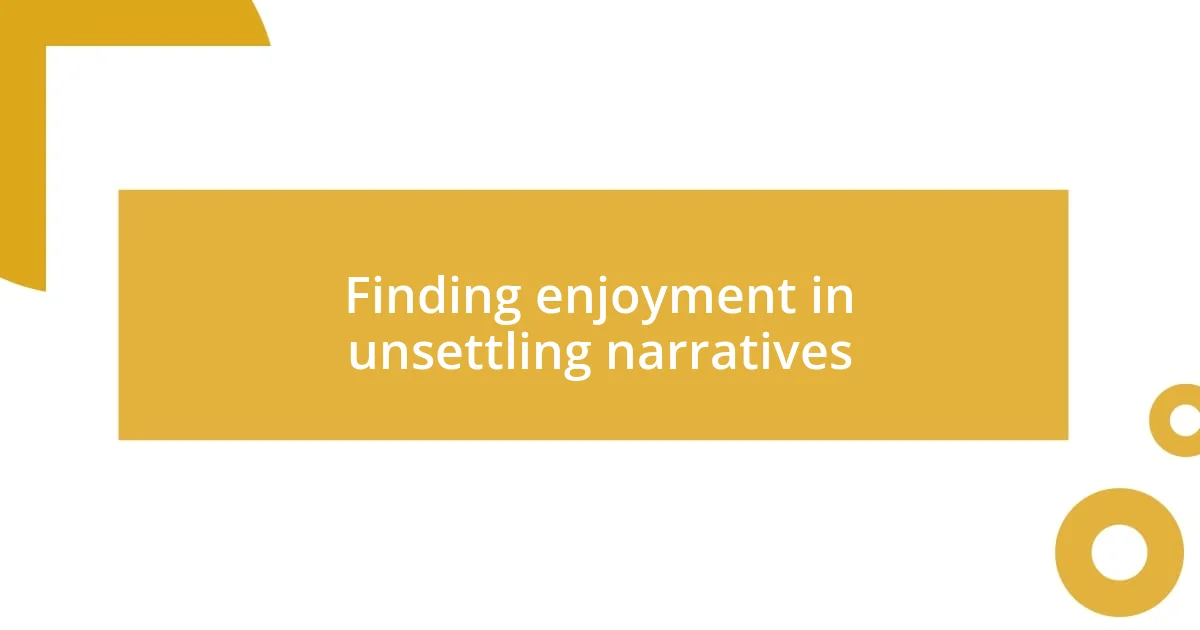
Finding enjoyment in unsettling narratives
Finding enjoyment in unsettling narratives can seem contradictory, but there’s a unique thrill that comes from navigating this discomfort. I often recall a time when I picked up a horror novel that left me both terrified and strangely fascinated. The tension was palpable, but as I reached the final pages, I discovered layers of meaning that transformed my fear into a sense of accomplishment. Isn’t it rewarding when a story challenges us and yet leaves us feeling more enlightened?
What I adore about unsettling narratives is their ability to spark deep, emotional responses. For instance, I read a short story that explored the haunting memories of childhood trauma. I found myself reflecting on my own past, recognizing how those unsettling feelings could be woven into the fabric of my identity. It made me appreciate that this kind of fiction isn’t simply about shock value; it’s about understanding the complexities of human emotion and experience. Have you ever felt that rush of recognizing a part of yourself in a character’s struggle?
Ultimately, engaging with unsettling narratives can push the boundaries of conventional enjoyment. I often seek out stories that provoke introspection, and one particular novel challenged my perspective on human nature itself. As I navigated its dark themes, I felt a growing appreciation for the author’s craft. There’s something exhilarating about wrestling with unsettling notions that forces me to question my beliefs. It’s a complex interplay of discomfort and insight, isn’t it?
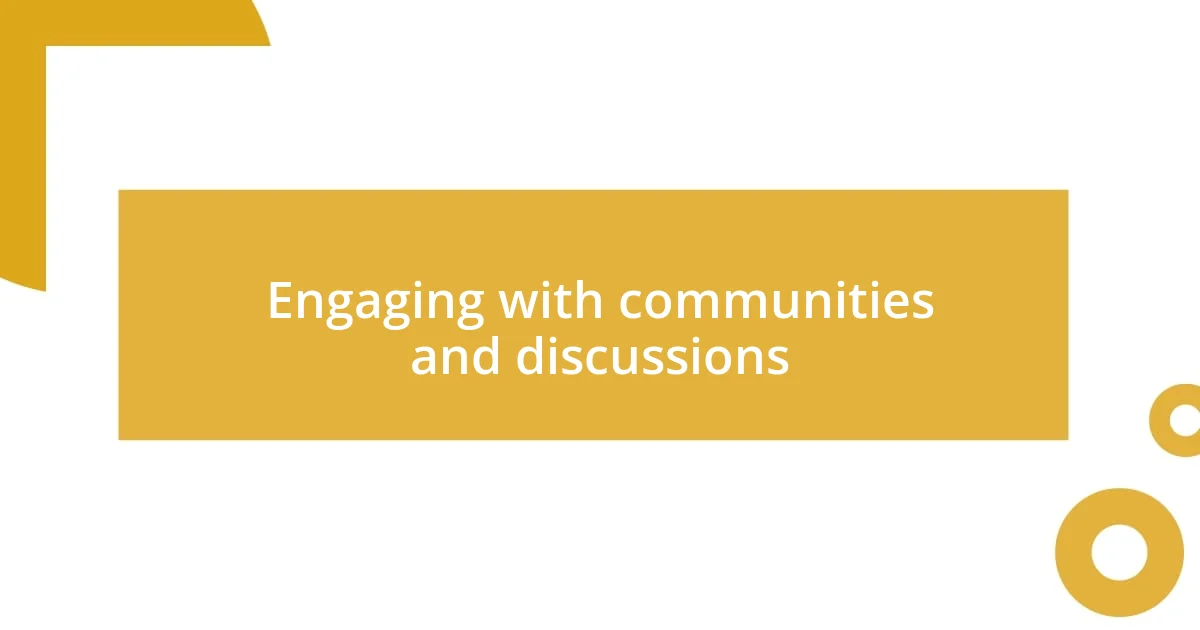
Engaging with communities and discussions
Engaging with communities around unsettling fiction has truly opened my eyes to new perspectives. I remember joining an online discussion group after finishing a particularly chilling novel. Sharing my interpretations and hearing others’ thoughts transformed my isolated reading experience into a rich tapestry of ideas. It’s incredible how a simple exchange can illuminate a story’s nuances that I might have missed on my own, isn’t it?
When these discussions get deep, I often find myself connecting with others on an emotional level. One time, a member shared their personal story related to a character’s traumatic past which resonated with my own experiences. Their vulnerability made me reflect on how unsettling narratives can be mirrors reflecting our inner turmoil. It reminds me that we’re never alone in our feelings about these stories; there’s a collective understanding that can arise from shared discomfort.
In my experience, participating in book clubs has been particularly enlightening. The thrill of discussing a plot twist or a character’s moral ambiguity often leads to heated debates. I recall a night when we passionately argued about a protagonist’s questionable choices, each of us bringing our own life experiences into our opinions. These conversations not only enhanced my appreciation for the fiction but also strengthened my connections with fellow readers. Isn’t it fascinating how literature can create bonds that last well beyond the pages?
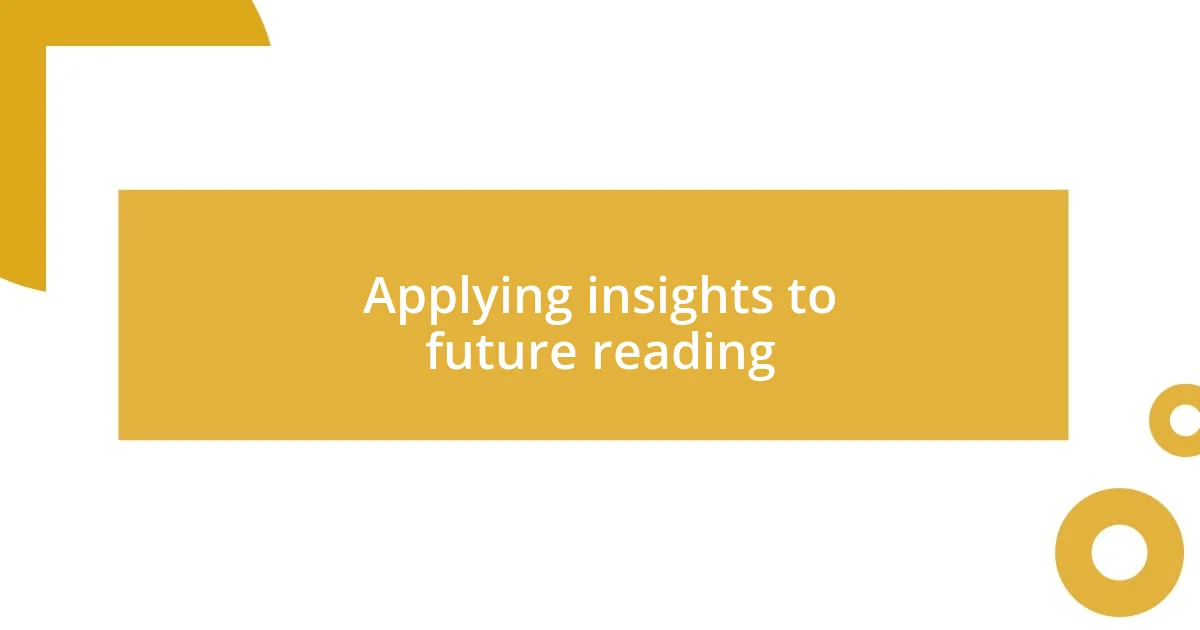
Applying insights to future reading
Navigating what I’ve learned from unsettling fiction has profoundly shaped my reading list. For instance, after recognizing my emotional response to a dystopian novel, I’ve consciously sought out titles that challenge my views on society and morality. This shift in approach allows me to anticipate the discomfort and embrace it, knowing that it will fuel a richer understanding of the human experience.
Whenever I encounter a new book, I think back to a specific moment when I wrestled with a character’s dark choices. Rather than shying away from that unease, I’ve learned to lean in and ask myself what fears or beliefs those characters might be reflecting. How often do we find ourselves avoiding narratives simply because they feel too real? By understanding this tendency, I now pick books that test my boundaries, allowing me to grow through discomfort.
Books that once seemed off-limits now feel like an invitation to explore deeper truths. I recall embarking on a journey through a collection of short stories that challenged societal norms—each narrative unraveling a layer of my preconceived notions. Why did these stories resonate so deeply with me? It’s the raw honesty within them that encourages reflection and exploration, turning what could be an daunting experience into a valuable learning opportunity.
